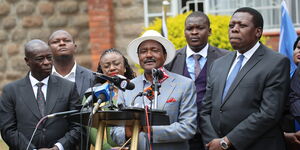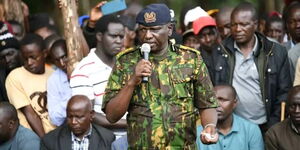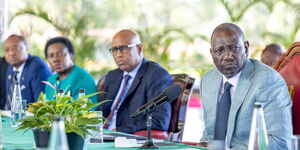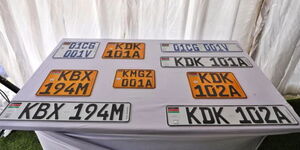Amid concerns that the mothers have no way out of the Middle East, the government has announced a raft of measures to support Kenyan single mothers stranded in Saudi Arabia alongside their undocumented children.
The State Department for Diaspora Affairs has clarified that there is a bureaucratic pathway for the stranded mothers to leave Saudi Arabia, but that it is not being properly utilised.
According to the statement, the Kenya Citizenship and Immigration Act and the Births and Deaths Registration Act govern birth registration for Kenyans abroad, with parents bearing the responsibility.
Kenyan diplomatic missions abroad are mandated to receive and process birth notifications, but strict local laws in Saudi Arabia have complicated this process.
"As per Saudi Law, pre or extra marital sex is illegal, and carries severe penalties, including arrest, imprisonment and/or deportation. Thus, conception and birth issuing out of such relationships is considered proof of an offence," the statement signed by Diaspora PS Roseline Njogu read.
As Saudi authorities require a marriage certificate to issue a birth certificate, many unmarried Kenyan mothers are unable to register the births of their children.
However, the government has clarified that children's rights are not affected by their parents' marital status, which creates a significant legal disconnect between the two systems.
Pathways and Mwanamberi Project
In a bid to ensure Kenyans in Saudi Arabia are safely repatriated, the government outlined pathways for mothers and their undocumented children to regularise their status, including through the Mwanamberi Project, which was launched in 2023.
The project entails a consular DNA sampling initiative, which helps establish parentage, enabling children born out of wedlock to obtain Kenyan birth certificates and documentation for citizenship.
The government also revealed the presence of Kenyan missions in Riyadh and Jeddah which have created dedicated channels for the affected mothers to submit birth registration documents and collect processed certificates.
"We urge the single mothers in KSA with undocumented children to utilise the pathways already created by the Government of Kenya to regularize their status and procure documentation for their children. They may contact the Embassy of Kenya in Riyadh, the Consulate in Jeddah, or the State Department for Diaspora Affairs in Nairobi. We urge those whose birth certificates are lying at the Kenya Embassy in Riyadh to immediately collect them," the statement added.
Concern was also raised over low turnout for the Mwanamberi Project since its establishment. Only 113 parents have applied for birth certificates and although 110 documents were processed, a third of the 113 applicants collected them.
Beyond documentation, Kenya established a Joint Interdepartmental Working Group with Saudi authorities to bring together the Kenyan Embassy, the Saudi Ministry of Foreign Affairs, the General Directorate of Passports, the Ministry of Labour, and the Ministry of Interior to create a sequential and lawful mechanism. The collaboration, according to the ministry, led to the safe repatriation of 59 mothers and 73 children.
Kenya also successfully negotiated an amnesty for out-of-status nationals, allowing undocumented Kenyans to regularise their status or leave the country without facing fines, detention, or other penalties.
Further, the government revealed that the Embassy was proactively trying to contact mothers whose children's birth certificates were ready for collection , urging them to take advantage of the document to enable them to leave the Middle East.
Kenyans in distress have also been encouraged to register through the Diaspora Ministry's official website to enable the government to track citizens more effectively and intervene promptly during emergencies.
The government's response came days after Kiambu Senator Karung'o wa Tnag'wa shared a video on his social media highlighting the plight of a Kenyan mother who had resorted to living in the streets after her job was terminated.












